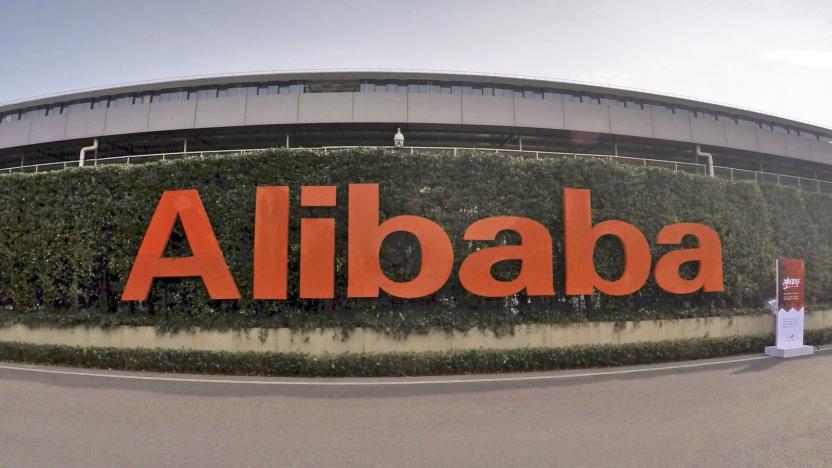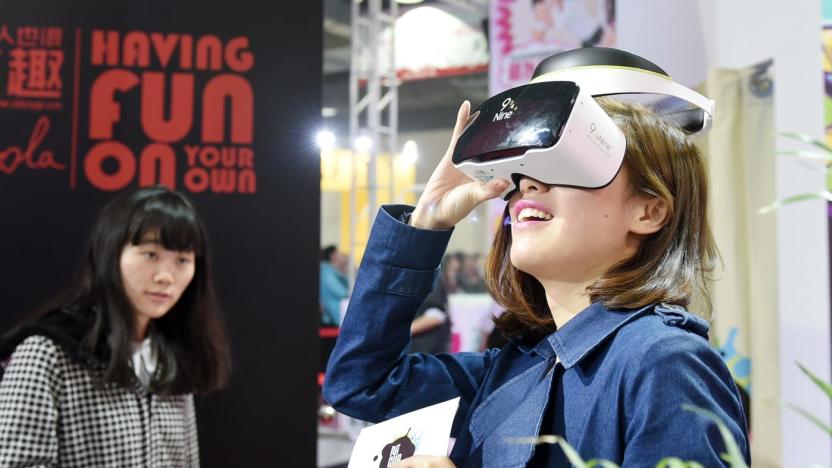Alibaba
Latest

How artificial intelligence can be corrupted to repress free speech
The internet was supposed to become an overwhelming democratizing force against illiberal administrations. It didn't. It was supposed to open repressed citizens' eyes, expose them to new democratic ideals and help them rise up against their authoritarian governments in declaring their basic human rights. It hasn't. It was supposed to be inherently resistant to centralized control. It isn't.
Andrew Tarantola01.20.2017
Snap Inc. is expanding its presence in China
Snapchat is officially banned by the Chinese government, but its parent company Snap Inc. is looking to expand its presence in the country's tech and manufacturing hub of Shenzen. According to a CNN, Snap Inc.'s Shenzen office will work on research and development related to Spectacles, the company's only hardware device, which is already being manufactured in China.
Andrew Dalton12.21.2016
Amazon Prime arrives in China to further challenge Alibaba
With over 63 million people already paying for Prime, Amazon is now expanding its subscription service to one of the largest marketplaces in the world: China. The retailer has announced that mainland users can now enjoy free, unlimited shipping on millions of domestic items, as well as others from the special "overseas orders" category. As part of a promotion that lasts until February, Amazon is offering the membership for $188 yuan (around $30) for the first year. Once this rate ends, Prime will cost 388 yuan (about $60) every 12 months.
Edgar Alvarez10.28.2016
Alibaba's first smart car is up for pre-order right now
After more than a year of development, Alibaba's first "internet car," the OS'Car RX5 sport utility vehicle, is available for pre-order in China. The SUV costs the equivalent of $22,230 (as a base price) and deliveries are expected to roll out in August. Alibaba partnered with China's largest automaker, the state-owned SAIC Motor Corp., to develop the new vehicle. The RX5 uses YunOS, the Alibaba operating system that powers its line of smart home appliances, including refrigerators, vacuum cleaners and air conditioners.
Jessica Conditt07.06.2016
Alibaba announces new system to track and remove fake goods
If you've ever shopped at Alibaba, you know to tread carefully: the online marketplace has long had a problem with merchants peddling counterfeit goods. It's given the site a bad reputation, creating tension between Alibaba and major brands. Today, the company announced a new program designed to smooth things out and help companies identify and remove fake products from Alibaba's marketplace.
Sean Buckley07.01.2016
Alibaba founder says fake goods have 'no place' on his site
Alibaba founder Jack Ma has written an editorial for the Wall Street Journal, restating his stance on pirated goods. Last week, while speaking at an investor conference, the WSJ quoted Ma as saying that counterfeit products are "of better quality and better price than the real names." However, the chairman has now taken to the paper to say that his statement was taken out of context, and that hooky goods have "no place on Alibaba." Indeed, Ma says that his company has "zero tolerance" for "those who rip off other people's intellectual property," adding that copycat goods is "akin to thievery."
Daniel Cooper06.23.2016
Alibaba founder: Fake goods can be better than the real deal
If you use a contract factory in China to produce your goods, don't be surprised if high-quality fakes pop up online. That's the feeling of Alibaba founder and executive chairman Jack Ma, who stands accused of effectively endorsing counterfeit goods while speaking at an investor event. The Wall Street Journal quotes the executive as saying that "the fake products today are of better quality and better price than the real names." It's a big issue for Alibaba, since its consumer-facing retail portals have something of a reputation for being the place to go when you want a knock-off device.
Daniel Cooper06.15.2016
Alibaba gave online shoppers a VR celebrity date
Alibaba really, really wants you to use its virtual reality shopping experience, and it's resorting to a clever tactic to lure you in: dream dates. The Chinese internet giant marked May 20th, a romantic pseudo-holiday, by giving Taobao mobile app users a virtual reality date with either famed actress Dilraba (if you were looking for a girlfriend) or the actor Yang Yang (if you wanted a boyfriend). If you had a mobile-friendly VR viewer and scanned in a QR code, your digital squeeze would help you wake up, make breakfast and otherwise keep you company. Think of it like Konami's augmented reality girlfriend app... just more immersive and private.
Jon Fingas05.23.2016
Yahoo reverses its Alibaba spinoff to save on taxes
After a week of debating options that included a possible sale, Yahoo has made a decision about its future... and it's probably not what you expected. The web pioneer is conducting a "reverse spin off" where everything but its Alibaba stake is moving to another company. Supposedly, this lets Yahoo go ahead with its original plan to spin off the Alibaba stake (and thus make investors happy) without the risk of a ton of US taxes. It also provides "more transparency" into how much Yahoo is worth, if you ask company chief Marissa Mayer.
Jon Fingas12.09.2015
Yahoo reportedly gets serious about selling its core business
Yahoo appears to have more than just a casual interest in selling itself off. Both CNBC and the New York Times claim that the web giant has ruled out spinning out its remaining stake in Alibaba and is instead thinking seriously about a sale, whether it's the company's stake in Yahoo Japan or the entire core business. It will reportedly take "a year or more" to assess everything, but you may not have to wait that long to get some official news -- Yahoo could announce something as early as Wednesday.
Jon Fingas12.08.2015
WSJ: China's government wants homegrown, backdoor-free phones
The Wall Street Journal is reporting that China's government has now leant on ZTE to produce a smartphone using predominantly local hardware that'll run COS, a homegrown operating system that's designed to be immune to US-based hacking attempts. The paper goes on to say that Alibaba is now working with the nation's ministry of public security to develop another operating system that's secure enough for police officers to use. It's all part of the country's attempts to put water between itself and the US in a post-Snowden world after backdoors were found in numerous American-designed products.
Daniel Cooper11.20.2015
China smashes sales records during its version of Black Friday
In the US there's Black Friday, but in China, they get all their big online shopping discounts on November 11 aka "Singles Day" instead. As of 4:28am ET today, Alibaba's Tmall, the Chinese equivalent of Amazon, has already made over $11 billion which broke last year's record of $8.97 billion. As reminded by our friends over at TechCrunch, both numbers from that platform alone beat the entire US' online sales of last year's Thanksgiving and Black Friday combined. It's no wonder Alibaba could afford to hire Frank Underwood Kevin Spacey and James Bond Daniel Craig to kick off this year's party.
Richard Lai11.11.2015
China gives its homegrown GPS rival another big push
Alibaba has teamed up with Norinco, a Chinese arms manufacturer, to roll out global positioning services using China's homegrown alternative to GPS. The two companies have sunk roughly $310 million into a new joint venture that'll harness Beidou's navigation satellites to provide mapping data to local businesses. It's another big step on the road to the country ending its reliance upon GPS, and comes two years after the service was opened up to heavy-duty transport vehicles and smartphones. It may not affect us outside of Asia-Pacific just yet, but with Beidou set to become available for all global users by 2020, it's worth keeping an eye on how good this new-fangled offering turns out to be. [Image Credit: ChinaFotoPress via Getty Images]
Daniel Cooper08.20.2015
Chinese shopping giant Alibaba is launching an HBO-like Netflix rival
Alibaba is already a cornerstone of China's online shopping space, and it's now setting its sights on one of the internet's other big draws: streaming video. Jack Ma and crew are planning to launch Tmall Box Office, a Netflix-like service that will combine HBO-like original video productions (hence the name) with content bought from both China and abroad. It'll represent a sharp break from the norm in China, where YouTube-style (and typically free) video portals like iQiyi and Youku Tudou tend to dominate. While about 10 percent of TBO's material will cost nothing, the rest will require that you either subscribe or pay per show. There's no telling how successful Alibaba's offering will be when it launches in a couple of months. However, we have a hunch that Netflix is feeling a lot of pressure to speed up its Chinese talks -- it'll want to get a solid foothold in the giant nation before it's too late. [Image credit: Tobias Schwarz/AFP/Getty Images]
Jon Fingas06.14.2015
Android's deviant identities
The story of Google's open-source OS and its resulting forked Android versions.
Jon Turi06.06.2015
The NSA tried to use app stores to send malware to targets
It shouldn't come as a surprise to hear that the NSA worked on iOS and Android malware meant to capture information from a target's phone, but actually getting the software onto phones? That's tricky. To help solve that problem, the NSA (and the rest of the Five Eyes intelligence community) attempted to hijack data being sent to and from app stores like those run by Samsung and Google. According to a document leaked by Edward Snowden, obtained by The Intercept and published by the CBC, it was mostly in search of a way to implant secret surveillance payloads into those data connections in hopes of identifying an Arab Spring in action in other countries.
Chris Velazco05.21.2015
Alibaba hopes visual codes will fight counterfeit goods
As you may have heard, Alibaba has a problem with counterfeit goods among its merchants -- you may not know if that Gucci bag is fake until it's too late. The Chinese online shopping giant may have a way to fight these bogus wares, though. It's implementing Visualead's Dotless Visual Code to help you verify your purchases as soon as you get them home. All you do is scan the QR-like symbol using Alibaba's Taobao app, and it'll tell you if you bought the real deal. These codes only work once and require specially developed scanning software, so scammers can't simply rehash codes or write apps that claim their products are legit.
Jon Fingas05.18.2015
Luxury brands sue Chinese online shopping giant for allowing fakes
It's no secret that luxury designers see Chinese online stores as a haven for fake goods, but they're now taking concerted action to shut down these less-than-official outlets. Kering, the parent company behind brands like Gucci and Yves Saint Laurent, is suing shopping giant Alibaba for allegedly letting counterfeiters sell their wares in the US and elsewhere. The company did nothing to shut these operations down even when told what was going on, according to the complaint. Kering had tried suing Alibaba last July, but it dropped the case in hopes of hashing out a deal -- clearly, those negotiations didn't get very far.
Jon Fingas05.16.2015
Alibaba tipped to invest in one of India's top phone makers
Alibaba's sitting on the better part of $20 billion, and it's using some of that cash to buy small, yet notable, pieces of the tech industry. So far, it's thrown money at Ouya, Meizu and Snapchat, but now Reuters believes that the Chinese e-commerce firm is going to buy a stake in Micromax. It's believed that the firm is looking to pick up a 20 percent stake in the Indian smartphone maker, with the deal reportedly worth around $1.2 billion. The idea, according to Reuters secret sources, is that Alibaba would use Micromax as a trojan horse, through which it could get its online sales business into the country.
Daniel Cooper05.08.2015
Alibaba posts job for 'open minded Lolita' encouragement specialist
Sometimes companies post stuff then react to the backlash with a "just kidding." Chinese internet company Alibaba says it was just kidding after it posted, then pulled an incredibly sexist job opportunity for a "Programmer Encouragement Specialist." The ideal candidate (translated from Chinese by Quartz) would, "effectively encourage teams of developers, bring them closer together, inspire excellent and lasting work." Then it gets bad: "recognizably good looks," and being "an open-minded Lolita like Sora Aoi" are requirements. Aoi is a Japanese porn star. After experiencing backlash from the Chinese media, Alibaba pulled the more salacious aspects of the posting and issued an apology. The new ad -- which has also been pulled -- stated that the job is now open to both men and women.
Roberto Baldwin05.01.2015